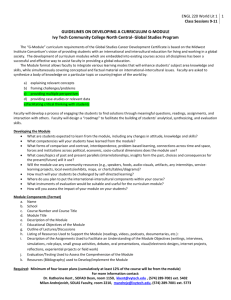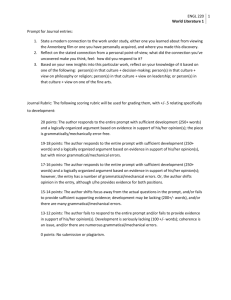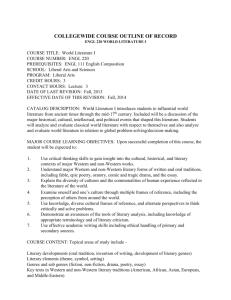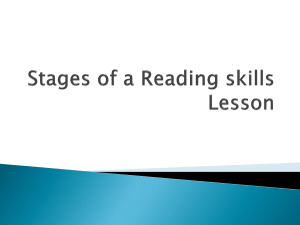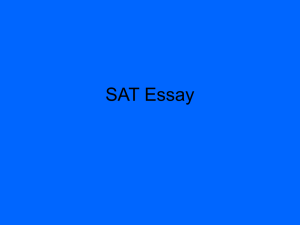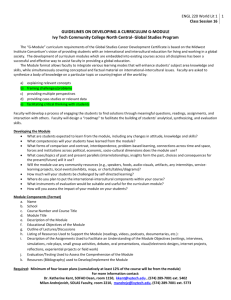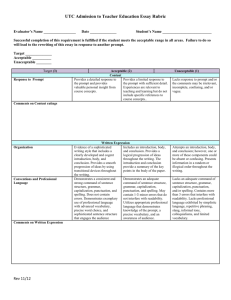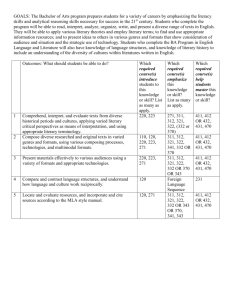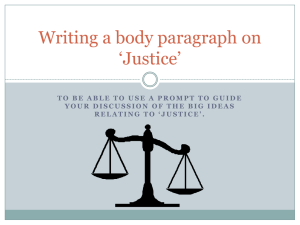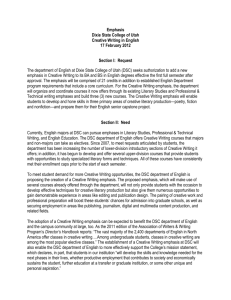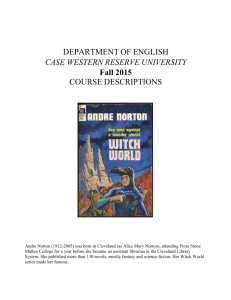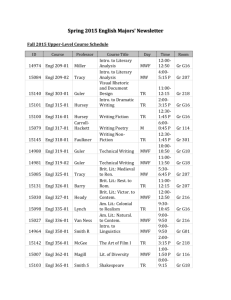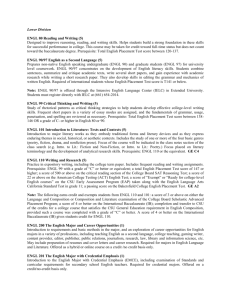Class Session 1: Journal 1 - Ivy Tech Community College
advertisement
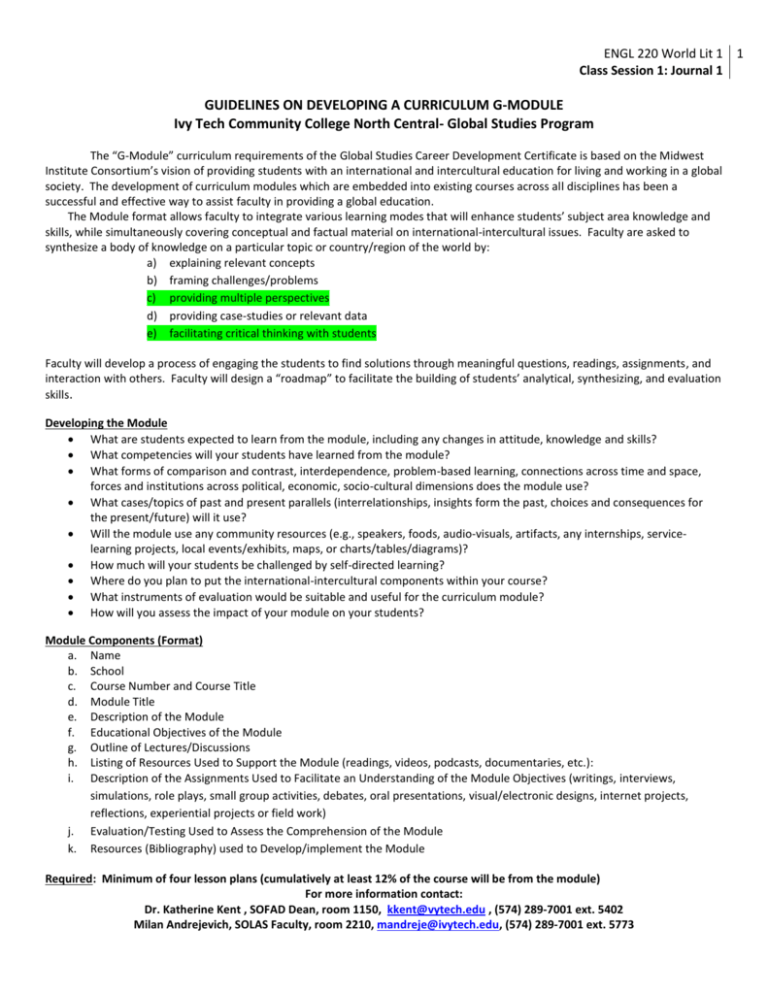
ENGL 220 World Lit 1 1 Class Session 1: Journal 1 GUIDELINES ON DEVELOPING A CURRICULUM G-MODULE Ivy Tech Community College North Central- Global Studies Program The “G-Module” curriculum requirements of the Global Studies Career Development Certificate is based on the Midwest Institute Consortium’s vision of providing students with an international and intercultural education for living and working in a global society. The development of curriculum modules which are embedded into existing courses across all disciplines has been a successful and effective way to assist faculty in providing a global education. The Module format allows faculty to integrate various learning modes that will enhance students’ subject area knowledge and skills, while simultaneously covering conceptual and factual material on international-intercultural issues. Faculty are asked to synthesize a body of knowledge on a particular topic or country/region of the world by: a) explaining relevant concepts b) framing challenges/problems c) providing multiple perspectives d) providing case-studies or relevant data e) facilitating critical thinking with students Faculty will develop a process of engaging the students to find solutions through meaningful questions, readings, assignments, and interaction with others. Faculty will design a “roadmap” to facilitate the building of students’ analytical, synthesizing, and evaluation skills. Developing the Module What are students expected to learn from the module, including any changes in attitude, knowledge and skills? What competencies will your students have learned from the module? What forms of comparison and contrast, interdependence, problem-based learning, connections across time and space, forces and institutions across political, economic, socio-cultural dimensions does the module use? What cases/topics of past and present parallels (interrelationships, insights form the past, choices and consequences for the present/future) will it use? Will the module use any community resources (e.g., speakers, foods, audio-visuals, artifacts, any internships, servicelearning projects, local events/exhibits, maps, or charts/tables/diagrams)? How much will your students be challenged by self-directed learning? Where do you plan to put the international-intercultural components within your course? What instruments of evaluation would be suitable and useful for the curriculum module? How will you assess the impact of your module on your students? Module Components (Format) a. Name b. School c. Course Number and Course Title d. Module Title e. Description of the Module f. Educational Objectives of the Module g. Outline of Lectures/Discussions h. Listing of Resources Used to Support the Module (readings, videos, podcasts, documentaries, etc.): i. Description of the Assignments Used to Facilitate an Understanding of the Module Objectives (writings, interviews, simulations, role plays, small group activities, debates, oral presentations, visual/electronic designs, internet projects, reflections, experiential projects or field work) j. Evaluation/Testing Used to Assess the Comprehension of the Module k. Resources (Bibliography) used to Develop/implement the Module Required: Minimum of four lesson plans (cumulatively at least 12% of the course will be from the module) For more information contact: Dr. Katherine Kent , SOFAD Dean, room 1150, kkent@vytech.edu , (574) 289-7001 ext. 5402 Milan Andrejevich, SOLAS Faculty, room 2210, mandreje@ivytech.edu, (574) 289-7001 ext. 5773 ENGL 220 World Lit 1 2 Class Session 1: Journal 1 GLOBAL STUDIES MODULE FORMAT Ivy Tech Community College North Central- Global Studies Program Name: Maribeth Anderson School: Ivy Tech Community College of Indiana—Region 10 Course Number and Title: ENGL 220 World Literature I CATALOG DESCRIPTION: World Literature I introduces students to influential world literature from ancient times through the mid-17th century. Included will be a discussion of the major historical, cultural, intellectual, and political events that shaped this literature. Students will analyze and evaluate classical world literature with respect to themselves and also analyze and evaluate world literature in relation to global contexts. Module Title: Ancient Mediterranean & Near Eastern Literature Description of the Module: Course Learning Objectives: 1. Explain the diversity of cultures and the commonalities of human experience reflected in the literature of the world. 2. Examine oneself and one’s culture through multiple frames of literary reference, including the perception of others from around the world. Educational Objectives of the Module (should constitute a minimum of 12% of the course): By the end of this session, you will be able to: maneuver in Blackboard 9.1; apply knowledge of classmates to future group assignments; demonstrate knowledge of plagiarism and some awareness of literary terminology and criticism; demonstrate some awareness of Ancient Mediterranean & Near Eastern literature; respond to prompts aimed at increasing cultural awareness, both modern & ancient. Outline of Lectures/Discussions: Read: Lecture 1: Introductions Lecture 2: Notes on Literary Criticism Lecture 3: Literary Terms Add: Journal instructions doc View: http://www.learner.org/courses/worldlit/gilgamesh/watch/ Listing of Resources Used to Support the Module (readings, videos, podcasts, documentaries, etc.): NAWL.A: pp. 3-59, 95-151 NLO: Audio Glossary, Literary Terms, Vol. A tab, Period Introduction Overview ENGL 220 World Lit 1 3 Class Session 1: Journal 1 Add: View video Description of the Assignments Used to Facilitate an Understanding of the Module Objectives (writings, interviews, reflections, experiential projects or field work): Complete Login assignment (see attached Word document). Complete Blog Introduction (see attached Word document & link below). Complete Library Exercise: Plagiarism Court: Click on the Resources button; then, click on #4, Plagiarism Court. Complete the Plagiacourt Quiz, "You Be the Judge." Copy the note in the upper left-hand corner stating your score or the results print-out, at the end of the quiz, and paste into a Message. Send to me by 1/21, 5 am. Add: Journal.1 View video & respond to the following prompt: 1. State a modern connection to the work under study, either one you learned about from viewing the Annenberg film or one you have personally acquired, and where you made this discovery. 2. Reflect on the stated connection from a personal point-of-view; what did the connection you’ve uncovered make you think, feel: how did you respond to it? 3. Based on your new insights into this particular work, reflect on your knowledge of it based on one of the following: person(s) in that culture + decision-making; person(s) in that culture + view on philosophy or religion; person(s) in that culture + view on leadership; or person(s) in that culture + view on one of the fine arts. Evaluation/Testing Used to Assess the Comprehension of the Module: (From Instructions doc) Journal Entries: You will also have three (3) journal entries; these require that you read the pages assigned for the week, review a film (link will be available in the appropriate Class Session folder), and respond to the following prompt via the link in the CS folder: 1. State a modern connection to the work under study, either one you learned about from viewing the Annenberg film or one you have personally acquired, and where you made this discovery. 2. Reflect on the stated connection from a personal point-of-view; what did the connection you’ve uncovered make you think, feel: how did you respond to it? 3. Based on your new insights into this particular work, reflect on your knowledge of it based on one of the following: person(s) in that culture + decision-making; person(s) in that culture + view on philosophy or religion; person(s) in that culture + view on leadership; or person(s) in that culture + view on one of the fine arts. Entries should be 250+ words and develop an error-free, logical argument; each journal entry is worth 20 points. The following scoring rubric will be used for grading Journal entries, with +/-.5 relating specifically to development: 20 points: The author responds to the entire prompt with sufficient development (250+ words) and a logically organized argument based on evidence in support of his/her opinion(s); the piece is grammatically/mechanically error-free. ENGL 220 World Lit 1 4 Class Session 1: Journal 1 19-18 points: The author responds to the entire prompt with sufficient development (250+ words) and a logically organized argument based on evidence in support of his/her opinion(s), but with minor grammatical/mechanical errors. 17-16 points: The author responds to the entire prompt with sufficient development (250+ words) and a logically organized argument based on evidence in support of his/her opinion(s); however, the entry has a number of grammatical/mechanical errors. Or, the author shifts opinion in the entry, although s/he provides evidence for both positions. 15-14 points: The author shifts focus away from the actual questions in the prompt, and/or fails to provide sufficient supporting evidence; development may be lacking (200+/- words), and/or there are many grammatical/mechanical errors. 13-12 points: The author fails to respond to the entire prompt and/or fails to provide evidence in support of his/her opinion(s). Development is seriously lacking (100 +/- words); coherence is an issue, and/or there are numerous grammatical/mechanical errors. 0 points: No submission or plagiarism. Resources (Bibliography) used to Develop/implement the Module: Norton Anthology of World Literature, 3rd ed., Vol A http://www.learner.org/courses/worldlit/gilgamesh/watch/ This video introduces the earliest work of literature—The Epic of Gilgamesh. Learn how this ancient story still inspires readers and artists today, and how its themes of power and leadership, and friendship still resonate. Global Learning Integration Worksheet AACU Global Learning Value Rubric http://acu.org/resources/globallearning/index.cfm
